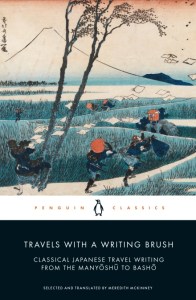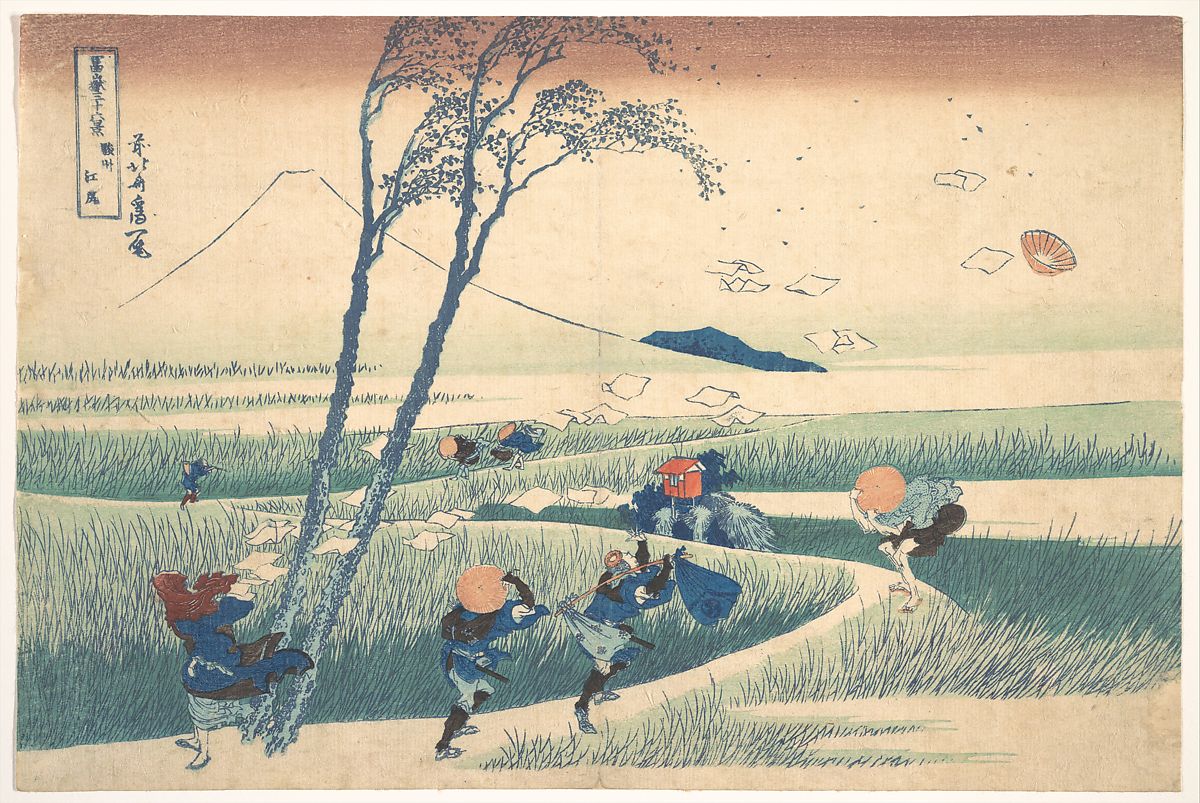
Last year Penguin published a selection of classical Japanese writings about travel. Travels with a writing brush, edited by the Australian translator Meredith McKinney, didn’t receive much attention at the time, but it’s a wonderful and wonderfully varied introduction to poetry and prose written in Japan between the seventh and seventeenth centuries. For anyone who’s thinking about western modes of thought about travel (walking in my case), this literature opens new and different perspectives.
The first section of the book gives selected poems from the earliest collection of literature in Japanese, the Manyōshū. There are over 4,500 poems on this anthology, collected in the middle of the eighth century but including some works written, or passed down orally, much earlier. At this time the Japanese state, based on the Yamato basin, and the culture associated with it were beginning to emerge. Long-distance travel, by road and water, became more common, and the experience of it is reflected in many of the Manyōshū poems. Often the poems are in two parts, first a chōka, a loose piece of variable length, part-verse, part-prose, and then a shorter hanka in the form on a 31 syllable tanka, a lyrical summation of the chōka’s theme.

Two things strike the Western beginner immediately about these poems. First, travelling far from home is a far from positive or exploratory experience for the writers. On the contrary, travel, on both land and sea, is rough, tough and dangerous, and undertaken by necessity, not through choice.
Drenched clothes
undried
from morning’s mist
do you cross alone
over the mountain path?(no. 1666)
A cruel rain
beats down on me
and at Sano Crossing
by Miwa Cape
there is no house for shelter(265)

This view of long-form travel, of course, is common enough in western literature before the era of the Picturesque and the Romantic. The second preoccupation of these early Japanese poems, though, is not so pervasive in our own tradition. Almost all them are suffused with strong interpersonal emotion, mainly feelings of loss and separation. Distant travel inevitably means being parted, for long periods, from your family and your close friends, and brings on homesickness.
I take for pillow
a pine tree’s root
on the shore of Takashi
in the land of Ōtomo
but my heart yearns for home(66)
Going, I look back
hoping perhaps to see her
turning, begging Do not go
but she does not come again
down the long road I travel(3132)
As the water bird
takes sudden flight I came
away without a word
to my father and mother
and now I am sorry for it(4337)

Longing to be reunited is a common theme. Some of the traveller’s longing is frankly sexual:
So many nights
spent on the journey
how I yearn now
thinking how long since my hands
loosened her crimson undersash(3144)
It seems my love
must be yearning for me
for as I slept, grass for pillow,
the knot of my undersash
somehow grew loose(3145)

What these short poems remind me of more than anything else is the American country blues of the 1920s and 1930s. The blues sprang from a black society in the South – and specially its musicians – who were constantly on the move. You hear the same suffering and yearning, the same sense of parting and loss, the same explicit expression. The Manyōshū poems also repeat stock or formulaic phrases and themes, just like the blues – maybe a reflection of the original oral transmission of both traditions. ‘Poor boy long ways from home’, one of the earliest blues lyrics, is Japanese in its concision and pain. Some others:
I’m going away
it won’t be long
I know you’ll miss me from singing this
lonesome songI’m going away
mmmm won’t be long
and then you know
you must have done me wrong(Lottie Kimbrough, ‘Going away blues’)
Tell me what time the trains come through your town
I wanna know what time the trains come through your town
I wanna laugh and talk with a long-haired teasing brownOne goes south at eight and one goes north at nine
One goes south at eight and one goes north at nine
I got to have a good talk with that long- haired brown of mineGo and get my black horse and saddle up my grey mare
Go get my black horse and saddle up my grey mare
I’m going on to my good gal, she’s in the world somewhereI can’t count these times and I’m so unsatisfied
I can’t count these times and I’m so unsatisfied
Sugar, the blues ain’t on me, but things ain’t going on right.(Blind Lemon Jefferson, ‘Black horse blues’)
Yes, I’m goin’, yes I’m goin’ away
Yes, I’m goin’, yes I’m goin’ away
I’m gonna leave here walkin’ down on Jeff Davis HighwayWhen you get lonesome darling, write me some day
When you get lonesome darling, write me some day
An’ if I don’t be in your town baby, I’ll be on Jeff Davis HighwayThe woman I was lovin’, she’s so far away
The woman I was lovin’, she’s so far away
That’s the reason I’m gonna leave here walkin’, down on Jeff Davis Highway(Lee Brown, ‘Jeff Davis Highway’)

One of the Manyōshū poems included in Travels with a writing brush is rather different. Written by Sami Mansei, it’s more philosophical in tone, and shows what Meredith McKinney calls a ‘Buddhist sensibility’:
To what shall I compare
this world?
It is like a boat at daybreak
rowing away and gone
leaving no trace.

McKinney closes her book with selections from the travel writings of the seventeenth century master Matsuo Bashō. His poems (haikai), embedded in prose in travel journals – the last and best known is sometimes translated as The narrow road to the deep north – are less direct: an extension of Sami Mansei’s poetic rather than that of the bulk of the Manyōshū poets . Walking for him was not a necessary evil but a spiritual and poetic activity in itself. Through constant movement he set out to find his true nature as a writer. This is the famous beginning of The narrow road:
The months and days are passing wayfarers through endless ages, and travellers too the years that come and go. Those who float their life away on boats or meet old age plodding before a horse – they spend their days in journeying, and call the journey home. And many of those men of old too died on the journey.
I myself for who knows how many years now have felt the straying wind-torn clouds entice me, my thoughts always of wandering.
As he prepares to set out on his long journey Bashō takes up his traveller’s brush to write his first poem, a perfect amalgam of personal sadness with a deep sense of the evanescence of life:
Spring passes –
birds cry, fishes’
eyes brim with tears


Leave a Reply